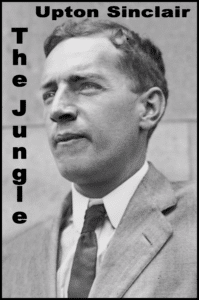
Upton Sinclair’s Novel “The Jungle” | WPRN Staff
Upton Beall Sinclair Jr. was an American writer, muckraker, political activist, and the 1934 Democratic Party nominee for governor of California. He wrote nearly 100 books and other works in several genres. Sinclair’s work was well-known and famous in the first half of the 20th century, and he won the Pulitzer Prize for fiction in 1943.
Upton Sinclair’s novel “The Jungle,” published in 1906, is a seminal work that exposed the harrowing conditions of the meat-packing industry in the early 20th century. Sinclair, a dedicated journalist and novelist, initially intended to highlight the plight of immigrant workers in Chicago. However, his narrative quickly evolved into a shocking expose of the meat-packing industry. The book provides an unflinching look at the lives of these workers, revealing not only their struggles with poverty and exploitation but also the unsanitary and dangerous conditions they endured daily.
The story of “The Jungle” follows a Lithuanian immigrant family led by the protagonist, Jurgis Rudkus, who moves to the United States with high hopes for a better life. Instead, they find themselves trapped in a cycle of poverty and abuse in Chicago’s Packingtown. Sinclair vividly describes the filthy conditions of the slaughterhouses, where rats were rampant, diseased cattle were processed for food, and workers often suffered severe injuries. These descriptions were so graphic and disturbing that they captured the public’s attention and outrage.
Sinclair’s primary goal was to advocate for workers’ rights and promote socialist ideals. He sought to illustrate how capitalism led to exploitation and inhumane working conditions. However, the public reaction to “The Jungle” focused more on the food safety aspects. Readers were horrified by what they might consume, leading to a public demand for federal food industry regulation.
The impact of “The Jungle” was profound and immediate. It played a crucial role in the passage of the Pure Food and Drug Act and the Meat Inspection Act of 1906. These laws established food safety and inspection standards, marking a significant step forward in consumer protection in the United States. Sinclair famously remarked, “I aimed at the public’s heart, and by accident, I hit it in the stomach.”
Despite its primary focus on labor issues, “The Jungle” remains more well-known for its effects on food safety reform. This outcome highlights the sometimes unexpected ways literature can influence public policy and awareness. Sinclair’s novel is not just a piece of muckraking journalism; it’s an essential historical document that offers a window into the harsh realities of industrial life in early 20th-century America.
In retrospect, “The Jungle” can be seen as a catalyst for change in two significant areas: workers’ rights and food safety. While the immediate legislative effects pertained more to the latter, the novel eventually contributed to broader discussions and reforms regarding labor laws and workers’ conditions. It underscored the need for governmental oversight in industries where unchecked capitalism led to dangerous and inhumane practices.
Today, “The Jungle” is studied not only as a piece of American literature but also as a crucial part of social and political history. It serves as a reminder of the power of the written word to effect change and the ongoing necessity to remain vigilant about the conditions under which our goods are produced. Sinclair’s work remains relevant as it continues to inspire discussions about workers’ rights, food safety, and the role of government in regulating industries.
![]()
